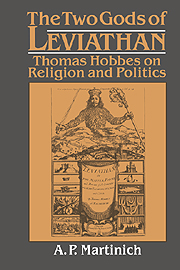Book contents
- Frontmatter
- Contents
- Acknowledgments
- A note on references
- Dedication
- INTRODUCTION
- PART I THE RELIGIOUS BACKGROUND TO HOBBES'S PHILOSOPHY
- PART II LAW, MORALITY, AND GOD
- PART III RELIGION WITHIN THE LIMITS OF SCIENCE AND POLITICS
- Chapter 7 GOD
- Chapter 8 REVELATION, PROPHETS, AND MIRACLES
- Chapter 9 ANGELS AND ESCHATOLOGY
- Chapter 10 THE CHURCH
- Chapter 11 SCRIPTURE
- Conclusion
- Appendix A Curley on Hobbes
- Appendix B Skinner on Hobbes
- Appendix C The frontispiece to Leviathan
- Notes
- Bibliography
- Index
Chapter 9 - ANGELS AND ESCHATOLOGY
Published online by Cambridge University Press: 30 December 2009
- Frontmatter
- Contents
- Acknowledgments
- A note on references
- Dedication
- INTRODUCTION
- PART I THE RELIGIOUS BACKGROUND TO HOBBES'S PHILOSOPHY
- PART II LAW, MORALITY, AND GOD
- PART III RELIGION WITHIN THE LIMITS OF SCIENCE AND POLITICS
- Chapter 7 GOD
- Chapter 8 REVELATION, PROPHETS, AND MIRACLES
- Chapter 9 ANGELS AND ESCHATOLOGY
- Chapter 10 THE CHURCH
- Chapter 11 SCRIPTURE
- Conclusion
- Appendix A Curley on Hobbes
- Appendix B Skinner on Hobbes
- Appendix C The frontispiece to Leviathan
- Notes
- Bibliography
- Index
Summary
In this chapter, I will continue presenting evidence for my thesis that, in addition to his project of providing a theory that justifies the existence of government, Hobbes had two principal aims: to reconcile traditional religious doctrine with the emerging modern science of Copernicus, Galileo, and Harvey; and to ensure that religion served the purpose of contributing to peace on earth, not anarchy.
Eschatology is the study of the last things: death, heaven, hell, and divine judgment. These topics will be discussed in this chapter. In addition, Hobbes's views about the alleged first creaturely residents of heaven and hell – namely spirits, angels, and demons – will be discussed. The chapter is divided into four sections. The first concerns angels, spirits and devils; the second, hell; the third, heaven and the Antichrist; and the fourth, salvation and redemption.
ANGELS
Spirit
Angels belong to the genus of spirits, in one of the several senses that the word has in the Bible. At the beginning of chapter 34, “Of the Signification of Spirit, Angel, and Inspiration in the Books of Holy Scripture,” Hobbes rehearses the way the word is used in the Bible, just as he does for “word of God” and “prophet” in chapter 36, as we saw earlier. Hobbes makes several other points that are equally important. One is that the word “spirit” has many uses and meanings in the Bible and that which meaning the word has on a given occasion can be determined only by intelligent attention to the context in which it occurs.
- Type
- Chapter
- Information
- The Two Gods of LeviathanThomas Hobbes on Religion and Politics, pp. 247 - 278Publisher: Cambridge University PressPrint publication year: 1992



